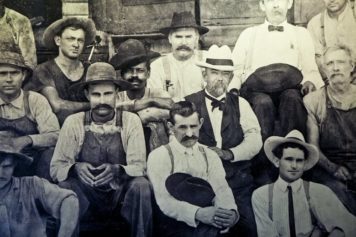The woman responsible for keeping the legacy of Nathan “Nearest” Green, the Black man believed to have taught Jack Daniel how to make his now-famous whiskey, came across a find that rocked her perceptions of Black-white relations in the South.
It was during a trip to Lynchburg, Tenn. two years ago that investor and New York Times best-selling author Fawn Weaver said she discovered the unlikely friendship between Green, a Black enslaved man on loan to a wealthy white preacher, and a teenaged Jack Daniel. Their bond was the foundation of what is now a multi-billion dollar whiskey company, according to The Tennessean. Weaver, who traveled with her husband on the discovery trip to a town with a name that would spark dangerous memories for many Black people, went without apprehension. “I’m not a fearful person like that,” she told the paper. “The way I look at it is if someone is racist it’s their issue, not mine.”
Daniel’s distilling prowess had long been attributed to a preacher and local store owner named Dan Call, who employed Daniel on his farm and taught him everything there was to know about whiskey. However, that narrative was upended by a 2016 New York Times article revealing that Green was actually the one who taught Daniel to distill.
The enslaved man would become Daniel’s teacher, mentor and eventual friend, according to the newspaper.
“This story will never be accepted unless it is indisputable,” Weaver said she thought to herself, motivating her to dig deeper into Green and Daniel’s history.
After learning of the pair’s special friendship in a 1967 biography, “Jack Daniel’s Legacy” by Ben A. Green, Weaver kicked her research into overdrive, scouring genealogies, tax documents and even birth certificates hoping to gain a better understanding of just who Nearest Green was. What she discovered was that Lynchburg may have been a bit more progressive in terms of race than previously thought.
“To have another family, a Black family, mentioned that many times is insane,” Weaver told The Tennessean of the book. She found at least 50 references where Green and his sons were mentioned. “That’s how I knew the story was a little more special.”
According to Green’s descendants and Weaver’s research, white and Black families lived, worked and played together in the months leading to up desegregation. Debbie Staples, Green’s great-great-granddaughter, grew up in Lynchburg in the 1960’s and said she never faced any racial tension or discrimination.
When it came to their relationship with Daniel, the family simply knew him as “Uncle Jack.”
The president of Jack Daniel’s Brands, Mark I. McCallum confirmed the brand knew of Green’s pivotal role in the whiskey brand’s story for some time. Their big unveiling in 2016 was nearly halted because McCallum was concerned about public perception. “I thought we would be accused of making a big deal about it for commercial gain,” he told the New York Times. The initial discovery was made for the brand in the 1990s when they uncovered a photo of Green’s son George sitting with Daniel. The unusualness of the photograph was enough for them to start digging.
It’s been some years since her initial visit to Lynchburg and Weaver says what she’s uncovered has surprised her. She went in thinking she’d get one version of Jack Daniel’s legacy and another about the company itself but instead found the story of two friends who worked hand in hand.
“We have the enormous responsibility of raising up one legend without harming the legacy of another,” Weaver told the paper. “Because I have no doubt if Nearest was here he would be raising a glass to Jack and Jack would be raising a glass to Nearest.”
It isn’t clear if Green was ever compensated for his work or whether his descendants are reaping the benefits of the close-knit relationship with Daniel and his family. Despite tales of facing minimal discrimination in a time when the deep south was known for lynching and mob violence, Weaver is the one taking on the mission to create a lasting legacy for Green, not Daniel’s descendants or the whiskey brand. Weaver and her husband have committed themselves and their resources to many projects, including making Green’s gravesite which was once secluded and hidden to a massive headstone worthy of his legacy.
There’s more, Weaver announced other plans to launch a number of special projects aimed at honoring Green, including a book chronicling the former enslaved man’s life, a memorial park and a scholarship fund for his descendants. She’s even launched a new brand of whiskey called Uncle Nearest.
For her, learning and preserving Daniel’s legacy has become just as important as preserving Green’s legacy.
“I am embarrassed, in a way, to share I had a bias against some towns in the South,” said Weaver’s husband, Keith. “What you may perceive in terms of a person or a place may not be true. The humanity that has been uncovered through this story and the relationship ultimately between Nearest and Jack can be inspiring.”
